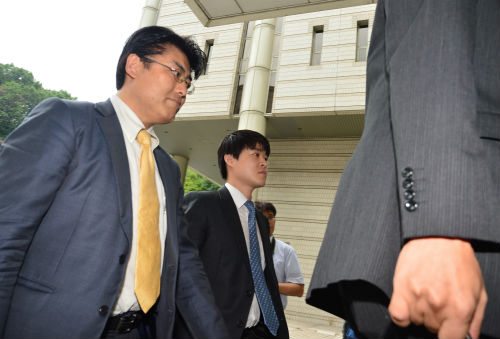“대통령 행적 의혹 제기에 고소? 민주주의 국가에서 상상 못 할 일”
세월호 참사 당시 박근혜 대통령의 ‘7시간 의혹’을 보도해 명예훼손 혐의로 기소된 <산케이신문> 기자에게 검찰이 징역 1년 6개월을 구형한 가운데, 국경없는 기자회가 비판 성명을 내고 기각을 촉구했다.
19일(현지시간) 국경없는 기자회는 “한국 사법부에 박근혜 대통령 명예훼손 혐의로 가토 다쓰야에게 내려진 1년 6개월의 구형을 기각할 것을 촉구한다”는 성명을 발표했다.
이날 서울중앙지법 형사합의30부(부장판사 이동근)는 가토 전 서울지국장에 대한 결심 공판에서 “박 대통령을 비방할 목적으로 명예를 훼손했다”고 1년 6개월을 구형했다.
국경없는 기자회는 박 대통령의 참사 당일 행적에 관한 의혹에 대해 “언론으로서 기사에서 보도된 추측과 소문들의 뉴스 가치는 논란의 여지가 많았다”며 “더욱이 그 의혹들은 이미 한국 신문인 ‘조선일보’ 사이트를 포함한 다양한 다른 웹사이트에 보도 되었다”고 지적했다.
기자회는 이어 “먼저 보도한 사람들에 대해 아무런 고소도 야기되지 않았다”고 비판했다.

국경없는 기자회의 아시아태평양 지부 대표인 벤자민 이즈마일은 “대통령의 행동에 대해 의문을 제기했다는 이유로 언론인을 기소하는 것은 스스로를 민주주의 국가로 여기는 나라에서는 상상도 할 수 없는 일”이라며 “한국 사법당국에 터무니없는 징역형을 선고하지 말 것을, 이미 접할 수 있는 보도를 근거로 했으며 이를 보도했던 사람들은 기소되지 않았다는 사실을 고려할 것을 촉구한다”고 밝혔다.
기자회는 이어 “산케이 신문이 반한(反韓)으로 여겨지는 우익 신문이라는 사실과 상관없이 검찰의 기소는 세월호 이후 언론이 박 대통령을 어떤 모습으로 보여줄지 같은 민감한 이슈에 대해 더 강력히 통제하고자 하는 욕구를 반영한다”고 지적했다.
아울러 “최고 7년 징역형까지 받을 수 있는 형사상 명예훼손죄는 정부를 비판한 기자들에게 실제적 위협이 된다”며 “한국의 명예훼손법이 박근혜와 그 측근들에 대한 원치 않는 보도와 논평을 억제하는 데 사용된 것이 이번이 처음은 아니다”라고 밝혔다.
기자회는 성명 말미에 “한국은 국경없는 기자회가 발표한 ‘세계언론자유지수’ 순위에서 지난 4년 동안 지수가 하라한 이후 2015년에는 전체 180개국 중 60위를 차지했다”고 덧붙였다.
한편, 국경없는 기자회는 지난 9월에도 가토 지국장의 기소를 반대하는 성명을 낸 바 있다.
| 다음은 <뉴스프로>가 번역한 국경없는 기자회 성명 전문 JAPANESE JOURNALIST COULD GET JAIL OVER COVERAGE OF SOUTH KOREA’S PRESIDENT PUBLISHED ON MONDAY 19 OCTOBER 2015. Reporters Without Borders urges the South Korean judicial system to refrain from imposing a jail sentence on Japanese journalist Tatsuya Kato on a charge of criminally defaming President Park Geun-hye. On Monday, prosecutors sought an 18-month jail term for Kato. A Seoul court is expected to issue a sentence on 26 November. The Japanese newspaper Sankei Shimbun’s former Seoul bureau chief, Tatsuya Kato was charged in October 2014 over a story posted on its website on 3 August 2014 speculating about the president’s activities on the day the Sewol ferry sank in April 2014. Headlined “President Park Geun-hye went missing on the day of the ferry sinking… who did she meet?”, the story elicited angry reactions from the president’s supporters and the prosecution was the result of a complaint filed by a nationalist group. Journalistically, the news value of the speculation and rumours reported in the article was highly debatable. Furthermore, the rumours had already been reported on various other websites including the site of the South Korean newspaper Chosun Ilbo without any complaint being brought against the authors of these reports. “Prosecuting a journalist for questioning the president’s actions is inconceivable in a state that regards itself a democracy,” said Benjamin Ismaïl, the head of the Reporters Without Borders Asia-Pacific desk. “We urge the South Korean judicial authorities not to impose a prison sentence, which would be disproportionate, and to take account of the fact that the offending article was based on reports already accessible online whose authors have not been prosecuted.” Kato was questioned repeatedly by prosecutors and was placed under close surveillance. His phone was tapped and his email account was hacked. After being banned from travelling abroad for nine months, he was finally allowed to leave Seoul in April. Regardless of the fact that Sankei Shimbun is a right-wing newspaper regarded as anti-Korean, such prosecutions reflect a desire to impose tighter controls on the way the media portray President Park, a sensitive issue since the Sewol disaster. Park’s handling of the crisis was much criticized and her popularity has declined significantly. A criminal defamation charge carrying a possibly seven-year jail term is a real threat for journalists who criticize the government. This is not the first time South Korea’s defamation laws have been used to suppress unwanted coverage and comments about Park and her close associates. South Korea is ranked 60th out of 180 countries in the 2015 Reporters Without Borders press freedom index after falling in the index for the past four years. |


